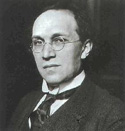|
Franz Schreker The Complete Songs
for voice and piano
Available at CHANNEL CLASSICS
RECORDS
 Franz
Schreker (1878-1934) was the most frequently performed
opera composer of his generation. His controversial
works dominated the central European repertory in the
years after the First World War and exercised a major
influence on such younger contemporaries as Alban Berg,
Kurt Weill and Ernst Krenek. An artist poised between
the intoxicating late Romanticism of fin-de-siècle
Vienna and the sober ‘New Objectivity’ of
Weimar Berlin, between a precipitous rise to fame and
an equally sudden fall from favor in which aesthetic
fashion and political intrigue played their parts, he
was forced into retirement by Hitler’s racial
decrees. In 1934, the composer, his music banned, died
a broken man. Thereafter Schreker became a forgotten
chapter in the history of new music. Franz
Schreker (1878-1934) was the most frequently performed
opera composer of his generation. His controversial
works dominated the central European repertory in the
years after the First World War and exercised a major
influence on such younger contemporaries as Alban Berg,
Kurt Weill and Ernst Krenek. An artist poised between
the intoxicating late Romanticism of fin-de-siècle
Vienna and the sober ‘New Objectivity’ of
Weimar Berlin, between a precipitous rise to fame and
an equally sudden fall from favor in which aesthetic
fashion and political intrigue played their parts, he
was forced into retirement by Hitler’s racial
decrees. In 1934, the composer, his music banned, died
a broken man. Thereafter Schreker became a forgotten
chapter in the history of new music.
Schreker’s music is only now beginning to enjoy
a revival.

|